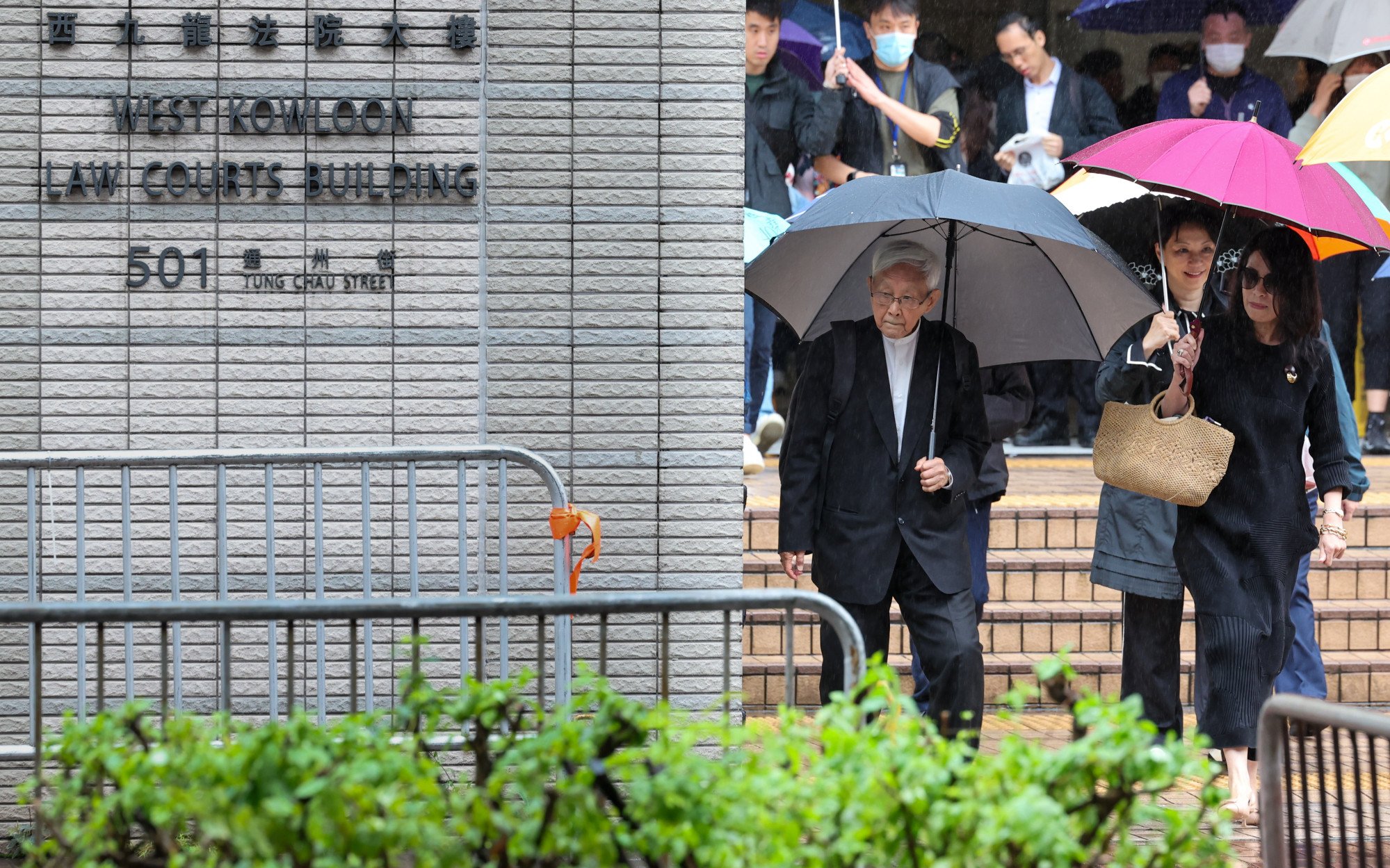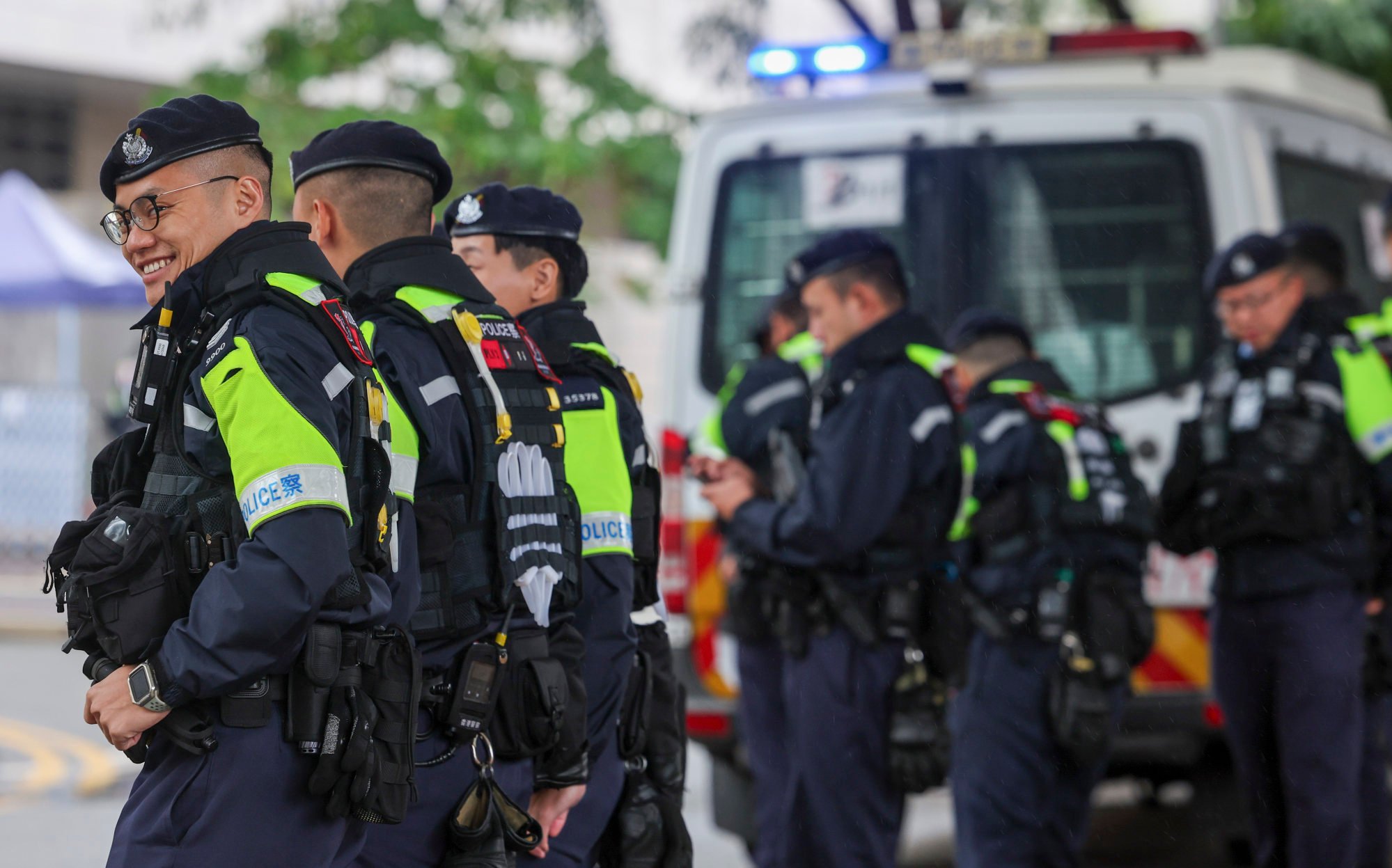Former media boss and opposition activist Jimmy Lai Chee-ying took to the witness stand for the first time on Wednesday in his high-profile national security trial, admitting he had donated money to local and overseas groups but denying that he used those connections to manipulate foreign policies on Hong Kong and mainland China.
Beijing rebuffed criticism by Western politicians of Lai’s prosecution, branding him as a “pawn of anti-China forces” as the trial of the owner of the now-defunct Apple Daily tabloid resumed at West Kowloon Court on a rainy morning.
The 76-year-old has been detained for nearly four years under the 2020 national security law for allegedly instigating international sanctions, a trade blockade and other hostile activities in a conspiracy involving local journalists, foreign politicians and activists.
Do you have questions about the biggest topics and trends from around the world? Get the answers with SCMP Knowledge, our new platform of curated content with explainers, FAQs, analyses and infographics brought to you by our award-winning team.
On the 93rd day of his trial, Lai, dressed in a green shirt and brown blazer, took the Catholic oath as dozens of people, including his wife and daughter as well as Cardinal Joseph Zen Ze-kiun, the retired bishop of Hong Kong, watched from the public gallery.

In 6½ hours of testimony that covered a wide range of topics, Lai lifted the lid on the expansive overseas network he had developed over the years. Among others, he had befriended former Taiwanese leader Tsai Ing-wen, ex-Hong Kong governor Chris Patten and numerous powerful political figures in Washington.
The White House had also invited him to join top-level discussions on Hong Kong with then US vice-president Mike Pence and secretary of state Mike Pompeo in July 2019.
He told the court he had introduced Tsai, of the independence-leaning Democratic Progressive Party, to two former American officials, ex-army general Jack Keane and former deputy defence secretary Paul Wolfowitz, to help her become familiar with the “sentiment and thinking” of the US government after Donald Trump was elected president in 2016.
Asked about his motive, Lai, who had run a media business in Taiwan, said he wanted to give the self-ruling island a lift.
“Because Taiwan is the only democracy of Chinese people, you know, the whole history of Chinese people,” he said.
Lai gave a brief account of his cordial relationships with British political figures who are critical of Beijing, including Patten, Benedict Rogers, founder of pressure group Hong Kong Watch, and David Alton, a member of the House of Lords.
He admitted once donating £20,000 (US$25,000) to Rogers’ group because he thought the activist “was doing something meaningful” to support the city.
Lai also justified his call for Trump in May 2020 to stop the city’s adoption of security legislation the following month by appealing to Apple Daily readers to file written petitions to the White House calling for US intervention.
Prompted by a judge to explain how he thought Trump could help, Lai said: “Maybe just ask China not to do it or whatever. A call to China, a call to Xi Jinping, whatever.”
He added: “Under the national security law, there is no way for us to practise as independent media, and also the subsequent events have proved that I was right.”
But Lai, who called himself “a businessman and social activist”, denied ever trying to influence foreign policy on Hong Kong or China or exploiting his friendships with overseas politicians to push a political agenda.
He maintained it was “beyond him” to ask the United States to take action in response to Hong Kong authorities’ crackdown on the months-long anti-government protests that erupted in June 2019 over a now-withdrawn extradition bill.
He also denied knowing American-born British financier Bill Browder and former Japanese lawmaker Shiori Yamao, both of whom prosecutors have named as co-conspirators in the collusion conspiracy.
Lai admitted he had made donations to local opposition parties and gave “small” annual amounts of US$30,000 to US$50,000 to US think tanks and religious groups, but said none of his money ended up in the pockets of political organisations abroad.
He said HK$118.66 million he had entrusted to his right-hand man Mark Simon, who formerly worked with US naval intelligence, was for him to make such donations on his behalf as well as for stock market investments.
Lai maintained that Simon did not have any connections with the US government, but said the American was among those pulling the strings for his meetings with Pence and Pompeo as well as US lawmakers in July 2019.
As for Apple Daily, Lai said he assumed the role of executive chairman of its parent company Next Digital in May 2020, a month before the security law took effect, because he felt he had to take responsibility “if anything happens to it”.
But the former media boss denied ever trying to exert influence on the paper’s editorial policies, adding he had never intended to use it to “pollute or corrupt” readers’ minds.

Lai said the newspaper, which folded in June 2021, had all along upheld Hong Kong’s core values such as the rule of law and the pursuit of freedom and democracy.
He stressed he had “always opposed violence in any form”, while advocacy for Hong Kong and Taiwan independence was “a conspiracy” that was “too crazy to think about”.
Lai also refuted allegations made by three former Apple Daily senior executives earlier in the trial that he had repeatedly interfered with the editorial direction of the newsroom since becoming politically active during the 2014 Occupy protests.
He singled out former editorial writer Yeung Ching-kee, saying he had no idea why the latter would feel he had turned “radical” after hearing a political speech by Pence in October 2018.
“If I was radical, I was radical all along,” Lai joked.
In Beijing, Ministry of Foreign Affairs spokesman Lin Jian branded Lai an “agent and pawn of anti-China forces” who sought to destabilise Hong Kong by orchestrating hostile activities.
“The Hong Kong government safeguards national security in accordance with Hong Kong’s Basic Law and Hong Kong’s national security law, which is justified by law, reasonable and irreproachable,” he said at a daily press briefing.
Lin was responding to an open letter issued on Tuesday by overseas politicians and foreign affairs experts from at least 22 countries, calling for Lai’s release from “inhumane” detention at the maximum-security Stanley Prison.
“We stand together in our defence of these fundamental freedoms and in our demand that Jimmy Lai be released immediately and unconditionally,” the letter said.
Lai, whose testimony continues on Thursday, has pleaded not guilty to two conspiracy charges of collusion with foreign forces under the national security law and a third count of conspiracy to print and distribute seditious publications in relation to Apple Daily.
His lawyers anticipate taking three weeks to question him before the cross-examination by prosecutors.
Additional reporting by Sammy Heung, Fiona Chow and Jess Ma
More from South China Morning Post:
- Jimmy Lai wanted Trump to stop Hong Kong national security law with ‘call to Xi’ – as it happened
- Hong Kong’s Jimmy Lai ignored objections to his letter campaign to Donald Trump, said being ‘brave’ only way to stop security law, court hears
- Hong Kong tycoon Jimmy Lai behind efforts to get then US president Trump to sanction China over national security law, court told
For the latest news from the South China Morning Post download our mobile app. Copyright 2024.





